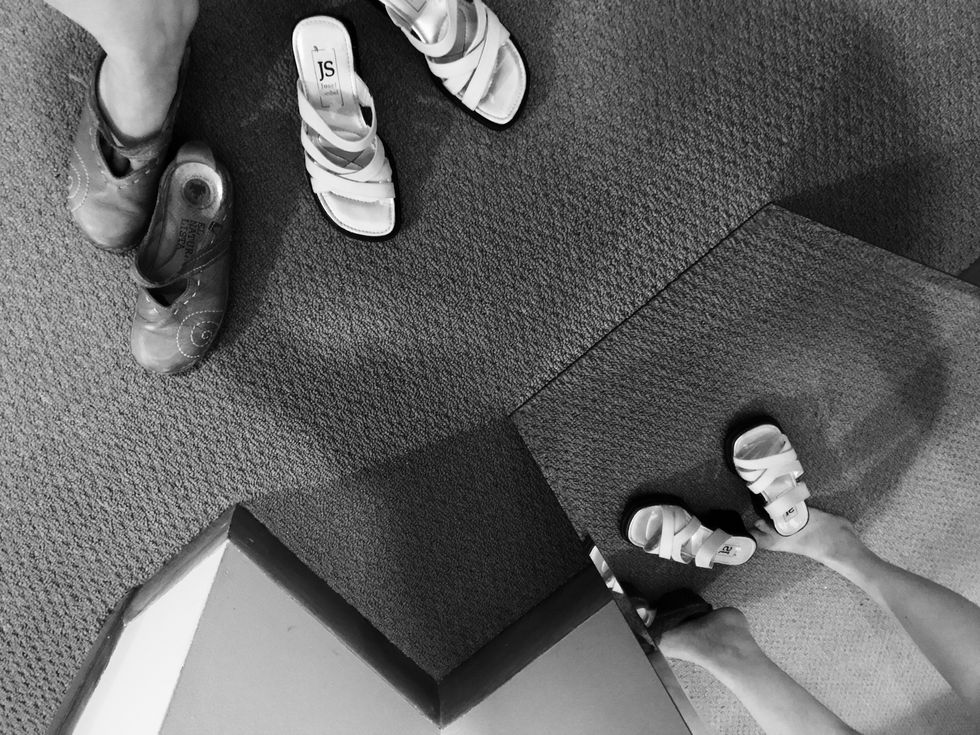Beethoven's c minor piano sonata portrays the disheartened and the hopeless in an all too familiar narrative. As it begins softly, yet with purpose, the original melody is presented to us as a solemn but bright musical strain. “Solemn,” however, may not be the best word to use; as the phrase develops, grows (dynamically and complexly), and reshapes itself, it can only be truly defined as an impassioned musical narrative. The melody line is repeated throughout the piece, through variations of its original melody. For instance, once introduced, it is repeated two to three measures later with parallel octaves—serving to only intensify the original phrase. This technique is used by various composers, including Beethoven, in order to solidify the tune in your mind. So much so that you can recognize it by the first three beats played. If you could sum up a composer with only two words (which is an impossible task to even consider) Beethoven would be “repetition” and “intensity.”
However, what I'll be focusing on is sadly not the great opus of Ludwig van Beethoven—but instead on its subject.
Pathetique, otherwise know as pathetic, is a word with various meanings and values behind it. Originally, in Beethoven’s time, it meant our version of sympathy: to sympathize with one's tragic, poor, forsaken plight. Again, unlike our modern context of the word, the word pathetic had no negative association; it was to understand and connect with emotion—to sympathize. What I find more curious though, is the current definition of pathetic.
In some variations the word grew to mean inadequate, inferior, laughable, and moving in a negative context. Rather than sympathy, it became pity. It suggests that not only is the “pathetic” subject in question locked in a terrible disposition, but that they somehow deservedthe plight they are trapped in; pathetic establishes a power relation.
Allow me to further clarify: when you see a child being put in a corner for misbehaving, you feel pity for them. You sympathize, of course, because you yourself have probably been given a similar punishment; however, it is because of that similarity you draw a conclusion that you and the child are somehow the same. You have both misbehaved, and therefore you (the child) should be put in the corner. To find someone or thing in a pathetic state, suggests that there is nothing that can be done for them. No action you take can change anything, and perhaps you shouldn’t change anything.
Now allow me to replace that child with a criminal, a teenage single mother, a homeless person, a hooded black man, a woman wearing “revealing clothing,” a woman wearing a hijab, and a man wearing defined “woman attire.” Yes; the lines begin to blur don’t they? Specifically in regards to the line that divides pathetic and sympathy—or more accurately, pathetic and judgment.
Sympathy, the concept of feeling compassion or sorrow for another person, directly contributes to the cognitive process of judgment. We cannot help but attempt to understand the rest of humanity—but it is through that courtship of “understanding” that we turn to assumption. Like that child, we assume we understand a person we sympathize with and in turn create a false impression that we would make better choices in their stead.
When we see a criminal in prison, we think we understand their plight, their mistake, and through that judgment we condemn them—guilty or not. While waiting in line to pay groceries, you see a woman and her child—the woman looks like a child herself—and you think, “I would never do that.” The characters and setting may change, but the narrative is always the same. I am not saying this is necessarily a bad or good thing—but essentially a part of human nature. We instinctively sympathize, judge, and condemn those around us because it is easier. True understanding requires time and communication; something that the majority of us do not have. Except, there is the capability and the capacity of awareness.
The late David Foster Wallace further explains this concept in his speech “This Is Water,”
“We rarely talk about this sort of natural, basic self-centredness, because it's so socially repulsive, but it's pretty much the same for all of us, deep down.”
I love his word use here: basic self-centeredness that is considered “socially repulsive.” Wallace’s “This is Water” is a truly one of a kind speech that I highly recommend to all of you. Here are some of his thoughts:
“None of this is about morality, or religion, or dogma, or big fancy questions of life after death. The capital-T Truth is about life before death. It is about making it to 30, or maybe 50, without wanting to shoot yourself in the head. It is about simple awareness - awareness of what is so real and essential, so hidden in plain sight all around us, that we have to keep reminding ourselves, over and over: ‘This is water, this is water.’”
Awareness is the key to ideal comprehension of both the world around us and the various independent natures we come across. "This is Water" refers to acknowledging our own stances in life, our privileges, and our hardships, only to in turn recognize other dispositions and life journeys. Rather than sympathize or empathize, we instead recognize the differences in our life choices and truly, truly, accept that we are not the center of the universe. To understand is to be aware; to be aware is to accept; to accept is to establish a healthy, equal, relation.






















